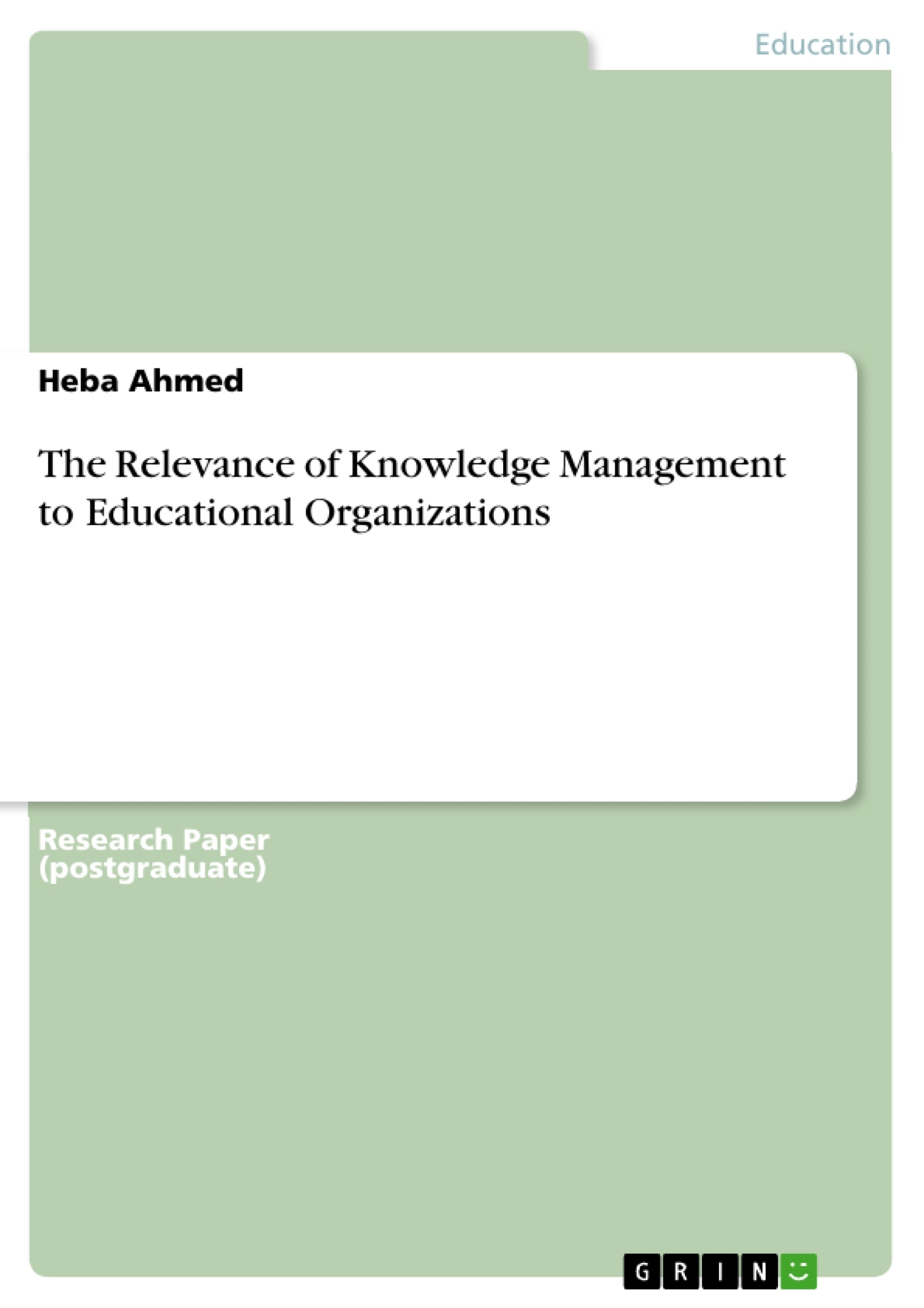This paper's research questions are: What is Knowledge and Knowledge Management? What is the relevance of Knowledge Management to educational organizations?
Knowledge Management (KM) is a fundamental asset in any organization, although intangible, it is the intellectual investment. It is the main drive for innovation and development. KM is a process by which an organization improves its business performance by means of developing, storing, and disseminating information. In order to remain competitive, organizations need to control the knowledge they have to be transformed into learning organizations.
Knowledge Management also helps organizations in organizing and transferring essential information and expertise needed in problem solving and decision making to improve the organizations’ effectiveness. Knowledge management is as critical in the educational organizations as in other fields. Educational for organizations are learning environments by nature and require arrangement and dissemination of knowledge for better improvement in performance and objectives.
Inhaltsverzeichnis (Table of Contents)
- Abstract
- Research Questions
- Introduction
- The Wiig Knowledge Management Cycle
- Knowledge Management in Educational Organizations
- Recommendation
- Conclusion
- Reference List
Zielsetzung und Themenschwerpunkte (Objectives and Key Themes)
This research explores the critical role of Knowledge Management (KM) in educational organizations. It examines how KM practices can improve organizational performance, facilitate knowledge sharing, and foster a culture of continuous learning. The work aims to understand the specific challenges and opportunities presented by KM in educational contexts and identify best practices for its successful implementation.
- The nature and importance of knowledge in organizations
- The benefits and challenges of implementing KM strategies in educational organizations
- The relationship between KM and organizational learning
- The key elements of effective knowledge management practices
- The application of KM principles to enhance teaching, learning, and research activities
Zusammenfassung der Kapitel (Chapter Summaries)
- Abstract: This section introduces the concept of KM and its significance in both general and educational organizations. It highlights KM's role in enhancing organizational performance and fostering a learning culture.
- Research Questions: This chapter delves into the fundamental questions that drive the research, exploring the nature of knowledge and KM, and their relevance to educational institutions.
- Introduction: This section provides a foundational understanding of knowledge, differentiating it from data and information. It also explores the concept of explicit and tacit knowledge, illustrating their significance in organizational contexts. The chapter concludes with a definition and importance of KM, outlining its role in creating learning environments and facilitating knowledge sharing.
- Literature Review: This section explores the Wiig Knowledge Management Cycle, a comprehensive model for managing knowledge within an organization. It then examines the specific application of KM within educational organizations, highlighting the challenges and opportunities inherent to this context.
Schlüsselwörter (Keywords)
The key terms and concepts explored in this work include Knowledge Management, organizational learning, educational institutions, knowledge sharing, explicit knowledge, tacit knowledge, information technology, learning environments, and organizational performance. These concepts highlight the core focus of the research on understanding and optimizing KM practices within educational organizations.
Frequently Asked Questions
What is Knowledge Management (KM)?
Knowledge Management is a process by which an organization develops, stores, and disseminates information to improve business performance and remain competitive.
Why is Knowledge Management relevant to educational organizations?
Educational organizations are learning environments by nature. KM helps them arrange and share expertise needed for problem-solving, decision-making, and improving overall performance objectives.
What is the difference between explicit and tacit knowledge?
Explicit knowledge is information that can be easily codified and shared, while tacit knowledge is personal, experience-based expertise that is harder to formalize and communicate.
What is the Wiig Knowledge Management Cycle?
The Wiig Knowledge Management Cycle is a comprehensive model explored in the research for managing knowledge effectively within an organization.
How does KM help in decision-making?
By organizing and transferring essential information and expertise, KM provides the necessary foundation for effective problem-solving and strategic decision-making.
Can KM transform an organization?
Yes, effective KM allows organizations to control their intellectual investment and transform into "learning organizations," fostering innovation and development.
- Quote paper
- Heba Ahmed (Author), 2020, The Relevance of Knowledge Management to Educational Organizations, Munich, GRIN Verlag, https://www.grin.com/document/988305



